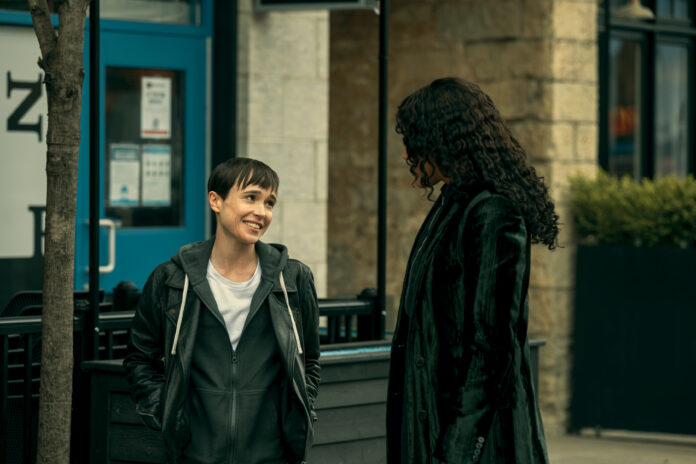
The following contains spoilers for Season 3 of “The Umbrella Academy.”
Season 3 of “The Umbrella Academy” dropped June 22, and the enjoyable sci-fi series is notable for deftly handling headliner Elliot Page’s transition in Episode 2. (Fun fact: it was directed by out filmmaker Cheryl Dunye, who lived in Philly for a spell.) For anyone who has not seen the series, Season 3 can mostly stand by itself even though there are a few references to people and events from the first two seasons.
For those who need context (or a recap), “The Umbrella Academy” has seven superhero siblings who were adopted by the eccentric billionaire Reginald Hargreeves (Colm Feore). The gifted crew include the actress, Allison (Emmy Raver-Lampman), the muscleman, Luther (Tom Hopper), the telekinetic Diego (David Castañeda), the flamboyant addict, Klaus (Robert Sheehan), Five (Aidan Gallagher) who is the brains of the operation, and Vanya (Page), who is the heart and conscience. (Ben, their other sibling, has died).
At the end of Season 2, the team had traveled back to 1963 and saved the word from an apocalypse. Vanya kissed Sissy (Marin Ireland) goodbye and tried to save the young Harlan (Justin Paul Kelly). However, when they arrived back home, they encountered “The Sparrow Academy,” a group of siblings adopted by Reginald Hargreeves who have stronger superpowers. Apparently, the Umbrellas are in an(other) alternate timeline.
As Season 3 opens, the Umbrellas are quite distressed to be dismissed by Reginald and bested by the Sparrows. A fight takes place, first as a nifty dance-off to “Footloose,” but then a real, full-on superpower battle that leaves many of the Umbrellas wounded. Holing up in the Hotel Obsidian, a retro, art deco hotel (that has seen better times), the Umbrellas need to figure out what is going on with the time paradox, and if there are doppelgangers at work. Most importantly, they have to regain their status with Reginald as his adopted children.
In Episode 2, Vanya goes for a haircut, a classic narrative trope signaling a life change, and re-introduces himself as Viktor to his siblings (save Luther, who is being held hostage by the Sparrows). Viktor says that this is “who I have always been,” and asks, “Is that an issue for anyone?” The response is uniformly no, as Diego, Five, and Klaus are all very accepting. In a private conversation with Allison later, Viktor explains, his sister “couldn’t have known” about his gender dysphoria, “because I didn’t fully know. Being with Sissy opened something in me,” indicating that he was, “hiding from who I really am.” After losing Sissy, Viktor claims “I can’t live in that box anymore…I won’t.” It is a wonderful and empowering moment, made even more special because of the simplicity of the statement and the support Viktor receives from Allison.
As Viktor acknowledges his siblings “see” him, he feels loved. There is an amusing bit when Luther returns and learns about Viktor’s transition after deadnaming him. Luther wants to throw a party to mark the occasion, but Viktor demurs, feeling loved enough without needing to commemorate it further. This is a sign of how easily Page’s real-life situation has been adapted into the storyline. Moreover, it enhances the camaraderie of the siblings, rather than becoming a plot point.
There are other discussions in the series as a whole that play on the idea of acceptance and rejection. A member of the Hotel Obsidian staff claims, “We take all kinds here,” which is meant to be a positive statement, but could have negative undertones. Likewise, when Viktor and Allison are at a diner for a meeting with one of the Sparrows, the clerk says, “We don’t let your kind in here.” It has both racial (Allison is Black) and transphobic connotations.
The series may use Viktor’s transition to make points about the siblings being a chosen family, even if much of the show’s humor stems from the loving siblings engaging in playful verbal sparring. In contrast, the Sparrows are a tight-knit group that work together in ways that make them stronger — and make some of the Umbrellas jealous — it actually prompts the Umbrellas to do better.
The theme of family is also explicit in Season 3 as Diego is forced to care for his 12-year-old son, and Allison’s daughter does not recognize her/exist. This provides a clue that something is off in the space/time continuum, a fact confirmed when Klaus goes searching for his birth mother and discovers that she died on his birthday — but before he was born.
The seamless incorporation of Viktor’s transition also keeps the focus on the action, and Season 3 is full of fight scenes and time jumping sequences that have the special effects team working overtime. A particularly fun sequence involves a battle in Episode 2 between some of the Umbrellas and Sparrows in a pharmacy. Other action scenes have the Umbrellas working together against the Sparrows, even getting assistance from a stranger who is the adult version of someone from Viktor’s past. (It would be criminal to reveal their identity.)
Viewers will just have to tune in to “The Umbrella Academy” to see what happens.
